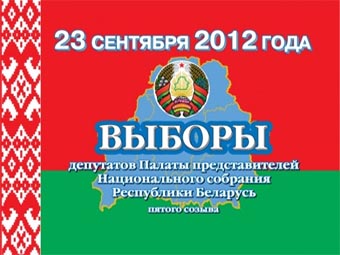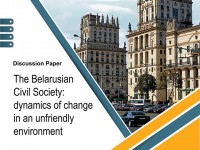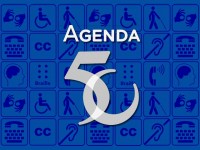We present a Discussion paper of dynamics of changes in the Belarusian civil society in 2015-2017.
Parliamentary Elections of 2012: A show in keeping with the worst traditions

Bring to your attention an article Director of the Centre for European Transformation Andrei Yahorau which was published in an annual integral analysis of the essential spheres of the state and society Belarusan Yearbook 2012. Electronic version of article was first published on the website of Belarus’ expert community Nashe Mneniye (Our opinion).
Summary
Parliamentary elections have always been less important in Belarus than presidential elections. The political value of the parliament (the National Assembly of Belarus), which is close to nothing, and nondemocratic election procedures make the parliamentary elections senseless. At the same time, election campaigns are used by various political forces to perform their tasks not directly connected with vote returns.
The parliamentary elections of 2012 were overshadowed by the dramatic finale of the 2010 presidential elections and impact of the economic recession of 2011. The issue of political prisoners, the international community’s heightened attention to Belarus, the democratic opposition in search of adequate forms of political activism and some other factors defined the general political context of 2011 and the year of elections. The open opportunities gave reason to expect that the government would attempt to improve the image of the country in the international arena, and the democratic forces would overcome their internal crisis and attract new supporters. Those opportunities were however missed.
Trends:
- The elections proved that the system of election manipulation was stable and the election process was fully controlled by the authorities;
- The democratic forces failed to achieve unity and benefit from the parliamentary election situation that puts in question their ability to remove obstacles during the 2015 presidential election for the sake of political transformations;
- The mobilization capacity of the opposition political parties and movements will reduce as they lack tangible results and accomplishments;
- Belaya Rus has shown its potential for transformation into a political party, but the country leadership is obviously not interested in this transformation for now.
Before the elections: Deformed election logic
The role of the National Assembly in the political system of Belarus comes to nothing but simulating an institution of democratic representation and legitimizing the political system. Election to the parliament is usually the last step on the way to honorary retirement for officials of the state machinery. Sometimes, the mandate also gives an opportunity to lobby group interests.
The parliamentary activity totally depends on decisions and volition of the executive branch [1]. The legislative activity is limited to passing bills sent from the Presidential Administration and the Council of Ministers. Members of parliament of the previous (4th) convocation only exercised the right of initiation of bills three times and all those times the bills were not ofvital importance [2].
The previous elections to the House of Representatives of the National Assembly, like the elections of 2012, show that the lists of future representatives are compiled beforehand and the election commissions only validate them later, in other words MPs are appointed, not elected [3]. The outcome of elections is so much predictable that a Nasha Niva observer named the new MPs quite precisely before the vote result was officially announced [4].
Before the elections held in June 2012, Belarusans were highly skeptical about the role of the parliament and the secrecy of ballot the elections are based on. According to a national opinion poll, only 44.5% of respondents believe that the House of Representatives influences their life; 46.9% say the seats in the lower chamber are distributed by the authorities in advance, and only 36.7% incline to the opinion that voters influence the results of elections.
It should be however noted that Belarusans trust the legislative branch and elections more than is reasonable to expect, and the majority (50.7%) traditionally expresses the willingness to vote. At the same time, the proportion of boycott advocates increased from 8.8% before the 2008 elections up to 14.2% in 2012. This figure among the opponents to the powers that be reached 40.3% in 2012 [5]. The protest mood before the elections was among other things caused by the recession of 2011, the consequences of which were strongly felt.
During the parliamentary elections, the ruling group checks out coordination and general stability of the power vertical if there is nothing else to focus on. Elections require mobilization of administrative resources for securing the entire process of electoral simulation from the preliminary approval of the lists of future MPs by the local and central authorities before the election commissions are formed and attraction of voters to polling stations down to vote count manipulations.
The authorities launch election campaigns almost a year prior to the elections. A media campaign aimed at attaching greater relevance to election topics started since autumn–winter of 2011. Media outlets were abundantly fed with contemplations about amendments to the laws on elections [6], adoption of the mixed or proportional voting system, speculations about dates of elections, etc. [7] Parties and NGOs loyal to the government, such as the Republican Party of Labor and Justice and the Liberal Democratic Party of Belarus, became very active and the situation with the transformation of the largest pro-governmental NGO Belaya Rus (‘White Ruthenia’) into a political party hit the headlines [8].
In April 2012, the release of two political prisoners — Andrei Sannikov and Dzmitry Bandarenka — gave the democratic forces renewed hope for some political liberalization. However, the authorities did not employ the situation with the elections to mend relations with the European Union. In June, by the time when the elections were announced, 14 political prisoners remained behind bars [9], and Hrodna journalist Andrzej Poczobut was taken into custody for insulting the president on June 21 [10]. In general, the authorities conducted a campaign of “quiet” and “stable” elections.
Amendments to the election code of 2010-2011 put some spin on the campaign. They simplified canvassing, generation of candidates’ electoral funds, TV debates, and established quotas on representation of political parties and public associations in election commissions.
The democratic forces (the opposition and civil society) did not create strong situations: the task to consolidate and develop a common strategy for the 2012 elections was not fulfilled. The previous debates on the election strategy (summer 2011 till summer 2012) within the “Coalition of the Six,” which included the Belarusian Popular Front, United Civic Party, United Left Party A Just World, organizing committee of Belarusan Christian Democracy party, the For Freedom movement, and the Tell the Truth campaign, were inconclusive and the opposition approached the start of the election campaign divided as ever [11].
Opposition parties and movements never managed to resolve the dilemma: boycott or campaigning [12]. It was politically irrelevant anyway, because unity was not achieved. Civil society organizations united in the National Platform of the Eastern Partnership Civil Society Forum said they would not be able to support political forces in the campaign unless they map out at least one distinct common action strategy [13]. Human Rights Defenders for Free Elections initiative of the Belarusan Helsinki Committee and Viasna Human Rights Center and For Fair Elections initiative of several political parties and civil society organizations, which included 13 various entities (or 27 counting regional organizations), were ready to engage in election monitoring [14].
Further events proved that the election campaign was absolutely predictable.
Election campaign: quiet elections
Independent observers acknowledged in July that the election campaign was “quiet”: there were no protest actions, candidates were canvassing on time, and boycott advocates were not heard much [15]. It basically concerned the entire period of the election campaign, which appeared to be quite uneventful.
Usual violations of the procedure were committed at all stages and they were reported by the international election observation mission of the OSCE and national observers. The process of formation of the election commissions was criticized for insufficient transparency, discrimination of the opposition, etc. Initiative groups for nominating candidates were sometimes groundlessly denied registration, which specifically concerns the groups of Ales Mikhalevich, Mikalai Statkevich and some other candidates. During gathering of signatures, the authorities used their administrative resources and pressurized members of initiative groups of the democratic candidates. Registration of some candidates was denied under invented pretexts and some of them complained about pressure and intimidation on the part of the special services. During the pre-election campaign, candidates’ statements for the mass media were censored. Many were forced to vote early and the turnout was overstated. The vote count procedure was nontransparent. And this list is far from being complete.
As a result, observers reported gross violations of the principles of democratic and fair elections established by the OSCE and Belarusan laws [16]. It is worthwhile to say that those violations committed by the authorities were merely typical, rather than outrageouslyshocking. The revealed “election roundabout” with fakeabsentee ballots was probably the most notable event, which happened for the first time in Belarus’ election rigging practice [17].
Opposition parties and movements did not do anything special during the elections and mostly focused on local tasks, specifically maintaining their “combat readiness” and greater publicity. All political entities split into three camps with regard to their attitude to the elections.
- Advocating a “boycott” was the Boycott Coalition: the organizing committee of Bielaruski Ruch (‘Belarusan Movement’), European Belarus campaign, Malady Front, Belarusian Social Democratic Hramada, and Conservative Christian Party Belarusan Popular Front standing apart.
- “Limited participation” envisaged nominating candidates and then pulling them out at the last moment in case the authorities would not meet certain requirements, such as the release of political prisoners, alteration of the laws on elections, etc. This strategy was supported by the Belarusan Popular Front, United Civic Party and Belarusan Christian Democracy.
- The United Left Party A Just World, For Freedom movement, Tell the Truth campaign, and Belarusan Social Democratic Party took a stand in favor of full-scale participation.
This confrontation of opinions confused democratic voters who were at a loss as to who would run the campaign and how, and what to do about that. The elections revealed the low mobilization potential of the opposition, who was obviously losing in this respect to pro-governmental pseudo-parties and Belaya Rus. The number of democrats nominated to the local commissions (the lowest level of participation) (Table 1, Fig. 1) and nomination of candidates (the highest level of participation) (Table 2, Fig. 2) prove this well.
Table 1. Nomination of democratic representatives to local commissions
|
|
Number
|
% of the total number of commission members
|
% of the total number of the commissions
|
|
Number of district election commissions
|
6301
|
|
|
|
Number of members of district commissions (total)
|
68945
|
|
|
|
Belarusan Agrarian Party
|
571
|
|
|
|
Belarusan Social-Sports Party
|
609
|
|
|
|
Communist Party of Belarus
|
845
|
|
|
|
Republican Party
|
262
|
|
|
|
Republican Party of Labor and Justice
|
832
|
|
|
|
Liberal Democratic Party of Belarus
|
0
|
|
|
|
Total from the “loyal”
|
3119
|
4.5
|
49.5
|
|
Belarusan Green Party
|
20
|
|
|
|
Belarusan United Left Party A Just World
|
216
|
|
|
|
Belarusan Social Democratic Party (Hramada)
|
30
|
|
|
|
United Civic Party
|
240
|
|
|
|
Belarusan Christian Democracy
|
171
|
|
|
|
Tell the Truth campaign
|
15
|
|
|
|
For Freedom movement
|
54
|
|
|
|
Belarusian Popular Front
|
158
|
|
|
|
Total from the opposition
|
904
|
0.01
|
14.3
|
|
“Belaya Rus”
|
4799
|
7.0
|
76.2
|
Source. Personal calculations of the author based on the data provided by the Central Election Commission and public sources.
Figure 1. Number of candidates nominated to the district election commissions

At the level of nomination of candidates, the opposition’s capacity is comparable with that of political “loyalists” (although it is far from the “550 Speakers Program” offered by United Civic Party leader Anatol Liabedzka [18]), whereas it is much weaker at the mass level. In Minsk, the largest opposition organizations — For Freedom and Tell the Truth — together with the Belarusan Popular Front, which joined them, only managed to mobilize resources to fully cover one constituency where they monitored the elections at all polling stations (Boycott-101) [19].
Table 2. Nomination of candidates
|
Nomination of candidates |
|
|
Belarusan Agrarian Party |
0 |
|
Belarusan Social-Sports Party |
1 |
|
Communist Party of Belarus |
23 |
|
Republican Party |
0 |
|
Republican Party of Labor and Justice |
19 |
|
Liberal Democratic Party of Belarus |
93 |
|
Total from the “loyal” |
136 |
|
Belarusan Green Party |
0 |
|
Belarusan United Left Party A Just World |
32 |
|
Belarusan Social Democratic Party (Hramada) |
15 |
|
United Civic Party |
48 |
|
Belarusan Christian Democracy |
0 |
|
Tell the Truth campaign* |
18 |
|
For Freedom movement* |
10 |
|
Belarusan Popular Front |
33 |
|
Total from the opposition |
156 |
|
“Belaya Rus”* |
70 |
* Data on Tell the Truth campaign (“Tellthe Truth: The Results of Registration of Candidates: http://zapraudu.info/govori-pravdu-itogi-registracii-kandidatov-v-deputaty/); For Freedom movement (Competition for the Parliament: 0.44 Oppositionists per Mandate: http://euroradio.fm/ru/report/konkurs-v-parlament-044-oppozicionera-na-odin-mandat-118509); Belaya Rus (Belaya Rus Actively Participates in the Ongoing Election Campaign: http://ont.by/news/our_news/0078769).
Source: Personal calculations of the author based on the data provided by the Central Election Commission and public sources.
Figure 2. Nomination of candidates

The canvassing campaign, which started one month before the date of the elections, brought no surprises either on the part of the authorities or the opposition. The “boycott” campaign was almost not seen on the streets, although the independent media were full of reports. As a result, according to independent sociologists, only 9.6% of respondents across the country (18.9% in the capital) boycotted the elections for ideological reasons, and 24% (37.1% in the capital) refused to vote without any political commitments [20]. Advocates of participation accused the boycotters of passivism and organized a quite effective campaign of demonstrative boycott (Boycott-101). Elections really did not take place in the constituency they chose.
Including the advance voting, by the end of the election day (September 23, 2012), the turnout was officially reported to be 74.61% [21] (66.4% according to the IISEPS poll [22]). The elections were deemed valid in all constituencies except No. 36 of Homiel-Navabielica where only one candidate ran for parliament and failed to poll enough votes. 109 members of the House of Representatives were elected in the first round. The elections to the upper chamber — the Council of the Republic — where perfectly silent as usual. Their results were announced on September 25. Senator mandates were given to all heads of the regional executive committees [23].
Some statistical results
Twenty-one lower chamber representatives were re-elected and kept their seats. Among the others were 63 members of Belaya Rus, 29 women and 5 members of the parties loyal to the president. Not a single representative of the democratic forces was admitted. State officials and directors of state-controlled enterprises dominate in the chamber (Fig. 3.).
Figure 3. Results of the elections to the House of the Representatives of the 5th convocation (previous occupation)

After the elections, IISEPS analysts said “it should have been acknowledged that the 2012 parliamentary elections followed a plan perfected during the previous campaigns. The elections did not become a moment of truth. Public discussions were sporadic and only concerned election process technicalities, rather than ways out of the economic recession. The authorities and society were well satisfied with those priorities.”
________________________
Kazakevich, A. Aktyunasc parlamienta zalezyc ad palitycnaj voli Lukasenki [Parliamentary activity depends on Lukashenko’s political will]. In Eurobelarus.info. Retrieved from http://eurobelarus.info/news/policy/2012/09/20/andrey-kazakev--ch--akty--nasts--parlamenta-zalezhyts--ad-pal--tychnay-vol-lukashenk--.html; Kazakevich, A. (2010). Belarusan Parliament of the Independence Era: Deputy Corps Evolution, 1990–2010. Political Sphere. No.15, p. 44–70.
2. Yahorau, A. (2012, June 25 - July 1). Bessmyslennaya aktivnost i ozhidayemye resultaty [‘Senseless activity and expected results’]. Belarusians and Market. No.24 (1008).
3. Kazakevich, Aktyunasc parlamienta, op. cit.
4. See: http://nn.by/?c=ar&i=80553&lang=ru.
5. Analytical materials on the 2nd quarter of 2012 IISEPS. June 2012. Retrieved from http://iiseps.org/12-02.html.
6. See: http://naviny.by/rubrics/politic/2011/10/18/ic_media_video_112_6086; http://naviny.by/rubrics/politic/2011/10/19/ic_news_112_378807/.
7. See: http://naviny.by/rubrics/politic/2011/11/09/ic_news_112_380224.
8. See: http://naviny.by/rubrics/politic/2011/09/29/ic_news_112_377341.
9. Decree of the President of the Republic of Belarus No.276 of June 18, 2012.
10. Weekly analytical report on monitoring results: June 18–24. In Human Rights Center Viasna. Retrieved from http://spring96.org/ru/news/53540.
11. See: http://euroradio.fm/ru/report/oppozitsiya-ne-dogovorilas-o-strategii-na-vyborakh-95932.
12. See: http://naviny.by/rubrics/elections/2012/06/18/ic_articles_623_178206.
13. Zuikova, A. Videnie grazhdanskim obshchestvom razvitiya situatsii v Belarusi [‘Civil Society’s Opinion on Developments in Belarus’]. In Centre for European Transformation. Retrieved from http://cet.eurobelarus.info/ru/news/2012/04/09/news_2349.html.
14. Weekly analytical report on monitoring results, see above.
15. See: http://naviny.by/rubrics/elections/2012/07/04/ic_news_623_396637.
16. Spravazdaca pa vynikach nazirannia za vybarami deputatau PP NS Respubliki Bielarus piataha sklikannia [‘Report on the Monitoring of the Elections to the Fifth House of Representatives of the Republic of Belarus’]. In Human Rights Center Viasna. Retrieved from http://spring96.org/be/news/59772; Final Report of the Election Observation Mission of the OSCE ODIHR. Retrieved from http://www.osce.org/ru/odihr/elections/98395.
17. See: http://euroradio.fm/ru/report/v-minske-nablyudateli-vyyavili-izbiratelnuyu-karusel-118351.
18. See: http://www.euramost.org/index.php?artc=15476&lang=1&print=1.
19. See: http://www.dw.de/a-16254429-1.
20. Bykouski, P. (2012, Oct. 29 – Nov. 4). Sotsiologi izmerili yavku i boikot [‘Sociologists measure the turnout and boycott’]. In Belarusans and Market. No.41 (1025).
21. See: http://www.rec.gov.by/sites/default/files/pdf/Elections-PPNS5-Soob5.pdf.
22. Strasti vokrug yavki [‘Turnout fever’]. Retrieved from http://iiseps.org/old/bullet12-3.html.
Others
-
Belarusan human rights defenders’ view on human rights activity and questions of cooperation between Belarusan human rights organizations
We present a research results report of Belarusan human rights organizations sector.
-
Social base of transformation programs in Belarus
We present a sociological research report (abridged version) of social base of transformation programs in Belarus.
-
Potential and opportunities for launching in Belarus the mechanisms to enjoyment of all human rights by persons with disabilities
We present a research results report (abridged version) of potential and opportunities for launching in Belarusan regions the mechanisms of local planning to promote, protect and ensure the full and equal enjoyment of all human rights and fundamental freedoms by all persons with disabilities.
-
Civil society’s role and place in the system of donor assistance to Belarus (2006-2014)
The Centre for European Transformation has prepared a working paper on civil society’s role and place in the system of external assistance to Belarus in 2006-2014.








Comments
From farewell to a new Eastern policy and towards a new development
Poland and Germany were both initiators and drivers of a New Eastern policy linked to the Eastern neighborhood and Russia/Soviet Union.